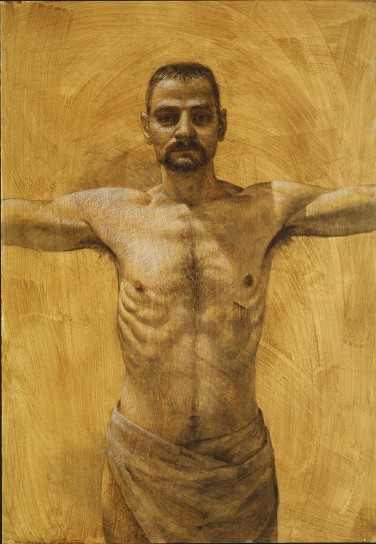December 10: Why Jesus Came
♫ Music:
Day 11—Wednesday, December 10
Therefore, since the children share in flesh and blood, He Himself likewise also partook of the same, that through death He might render powerless him who had the power of death, that is, the devil, and might free those who through fear of death were subject to slavery all their lives.
Hebrews 2:14-15
WHY JESUS CAME
My first thought upon seeing Melissa Weinman’s Study of Christ is how ordinary the Christ-figure looks.
Artists seem to prefer an extraordinary Jesus—one who is extraordinarily handsome, compelling and comforting, or extraordinarily anguished, tormented and spent—yet in all cases extraordinary.
But the author of Hebrews says Jesus “partook of the same,” and Weinman appears to have taken this quite seriously. Her Christ really does look like ordinary flesh and blood. Sinewy, swarthy. . . shaky haircut. His build is north of skinny, but a good ways south of ripped. His face—not ugly but not attractive. The wound in his side is unmistakable, but also unremarkable. All in all, he could pass for just another guy on the bus—or possibly a carpenter of Middle-eastern descent.
All of this got me thinking about my ordinariness. I’m not too fond of it. I think I have a lot of company in this regard. Indeed, I think one of our greatest fears is the fear of being ordinary. We can’t stand the thought of being just like everybody else. We want to be smarter than others, or more successful, or more attractive. We spend billions of dollars on make-up and clothing and haircuts because we don’t want to look ordinary. And if that doesn’t suffice, we opt for cosmetic surgery, or steroids. Students, I have found, do not like getting ordinary grades. It is an insult to be average. Most of us are desperate to be special and are haunted by this quiet fear of being ordinary.
This leads to my second observation about Weinman’s Christ, which is that he looks very unintimidated by his own ordinariness. His steady stare betrays no fear, nor does it make me worry he might not finish the task at hand. If anyone seems undisturbed by being ordinary, it is this Christ. He is disturbingly undisturbed.
Gregory of Nazianzus famously stated that “the unassumed is the unhealed,” implying that Jesus was God incarnate from the very first moment of conception. Mary bore God in her very womb. Why? He assumed all of human life so he could heal all of human life. He took a fully human body for the full course of human life—cradle to grave, or more precisely, cradle to grave to empty grave.
Weinman’s ordinary Christ makes me wonder whether Jesus also came to heal our attitude toward the ordinary. What if he wanted us to be completely unintimidated by being ordinary? What if human ordinariness were so extraordinary that it could bear the weight of incarnation? What if the thought being made in the image of God was extraordinary enough to make the trophies, and grades, and promotions, and publishing, and power and prettiness into ordinary things in comparison? What if God could take on flesh and look ordinary?
And perhaps, if we approached Jesus and let him bear our ordinariness, it would weigh less heavily upon our own shoulders. Perhaps it would make us a bit more at peace with who we are and who we aren’t. Perhaps it would help make our yoke a bit easier and our burden a bit lighter.
Lord Jesus, thank you for your courage to partake of the same flesh and blood that seems so ordinary to me. Give me the grace to turn my ordinary fears, my ordinary pains, my ordinary failings, and my ordinary troubles over to your extraordinary grace. And Lord, help me relish the extraordinary ordinariness of human flesh and blood that could bear the weight of God incarnate.
Amen.
Rick Langer, Talbot School of Theology
Study for Christ
Melissa Weinman
About the Artist and Art
Melissa Weinman is currently a professor of art at the Gage Academy of Art in Seattle, WA. She works in oil, creating paintings and series of paintings that are often set in diptych or triptychs. She is interested in reflective materials, often painting bodies of water or clouds, which deal with light in different and interesting ways.
www.melissaweinman.com/
About the Music
His Humanity Lyrics
Born in flesh, like you and me
In His humanity
To be believed, for all to see
His identity
In flesh and blood, in tender skin
His birth begins the story
From an empty grave He rose to save
And this became the beginning of good news.
His familiar voice, its changing tones
His laugh, His groan; His smile
All the sleepless nights, His lonely grief
Their disbelieve, His sighs
His homelessness, His weariness
Asleep on a stormy sea
Soaked by the rain, while in His veins
His blood contained the hope
For all the world
He was hungry, He was happy
He was tired, He was thirsty
He could sorrow, He could savor
He could marvel at the flowers
He could thrill hearing the birds sing
He could weep at the first sign of spring
His hour had come, far too soon
With the waxing of the moon
Caught up in a tide of hate and lies
A torrent toward the tomb
Midst the pain and the fear
His joyful tears
Blended with His bleeding
In the endless ache His eyes await
And dilate with the darkness
He is bleeding, He is pleading
He is crying, He is dying
As he fights to go on breathing
His mind sees each soul
He will redeem
About the Performer
Michael Card (b. 1957) has been writing, recording, and releasing contemporary Christian music since 1981. He has released 31 albums, written 19 #1 singles, and has authored and co-authored 24 books.
www.michaelcard.com/
